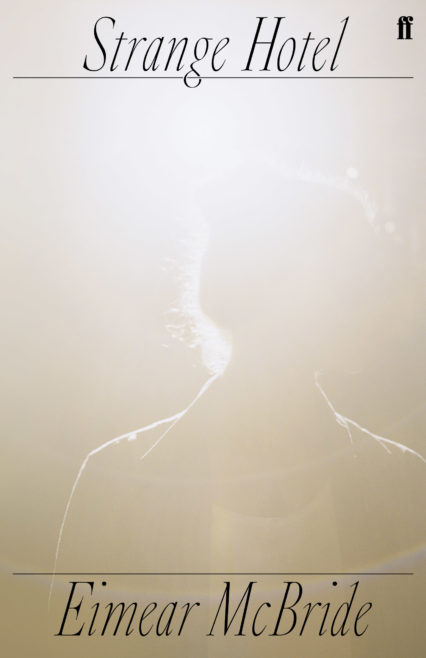Rosie Couch explores the role of the hotel in literature as a space for deconstructing memory, and finds in Strange Hotel, the latest novel from Eimear McBride, a powerful device.
Consider, for a moment, a hotel room. An in-between space, near-identical to its many neighbours, hyphenating the small hours between night and morning. Each room has its predictable accoutrements: rough cotton sheets, checked for anything conspicuous; hard armchairs for balancing feng-shui and discarded objects, sit at your own risk; mass-produced canvases masquerading as tasteful art; palm-sized plastic containers of 2-in-1 shampoo and conditioner, promising luxury, granting split ends; floor to ceiling windows; the novelty of a balcony; ineffective hairdryers; the tipsy temptation of the mini-fridge. These uncanny, temporary rooms are fit for purpose. A place to rest before the events of that night, the next day. Meetings, conferences, weddings, parties.
Trysts abandoned as quickly as the rooms themselves, sheets twisted, disturbed. The unnamed protagonist of Eimear McBride’s new novel Strange Hotel (2020) is au fait with such spaces. Constantly on the move, the protagonist’s incessant international traversal towards these uncanny rooms is also an act of return. (Re)Visiting hotels in countries including France, Norway, and New Zealand – with many others listed amongst intermittently amongst the narrative – memories of past visits are always threatening to encroach upon the protagonist. ‘Going forward,’ she states, ‘is the point’, ‘regretting the prose’ that the indulgence of such digression brings to mind. Deviation remains, however, just an undisciplined slip away.

Written ‘in the gaps’ of a creative fellowship with the Samuel Beckett Research Centre, Strange Hotel exhibits a shift from the broken syntax of McBride’s previous novels: A Girl is a Half Formed Thing (2013) and The Lesser Bohemians (2016). It would be a mistake to enter the cramped rooms of this text with the assumption that it might present an easier, more straightforward read than McBride’s existing work. Slight but dense, Strange Hotel‘s elaborate and yet highly technical prose is a strategy of distance. While the chaos of Girl’s stream-of-consciousness style instantly plunges us into its unnamed teenage protagonist’s spiralling trains of trauma and desire, Strange Hotel tries its hardest to keep its reader at arms length. The space created – between what is present in language, and what is thought, intimated, fleetingly felt and yet denied – is also cultivated as a means of distancing the protagonist from herself. Try as she might, the prose is littered with darting stabs of memory, glimpses of the past held within the spaces that she (re)inhabits.
While Strange Hotel is, McBride notes, ‘infused’ with Beckettian themes, such as ‘the idea of the mind devouring itself’, it is possible to sense the presence of another fictional literary afterlife permeating the novel’s pages. As past feelings, images, and lives uneasily (re)impress themselves upon McBride’s protagonist, it is possible to sense an evocative return to the main character of Jean Rhys’ Good Morning, Midnight (1939): Sasha Jansen. In Rhys’ text, her rootless, often-inebriated protagonist is found sloping around 1930s Paris and occupying a series of interchangeable hotels. The ‘cheap gramophone records’ recalling ‘[h]ere this happened, here that happened’ infiltrate Sasha’s head as she walks the Parisian streets. The hotel rooms, too, are ‘quite like old times’ – saturated with the loneliness, missteps, and regrettable interactions, of days gone by. Rhys’ eye for the nuances of human interaction can also be found in Strange Hotel, in the ‘knitted brow’ of a dejected one night stand, or the ‘long fingers’ of a lost love, absent-mindedly ‘making knots’ on a shared quilt.

As with Good Morning, Midnight, McBride’s text articulates a mode of femininity that is contextually untethered, edging into mid-life, encumbered only by memory. However, unlike Rhys’ text – and illustrating a break from the turbulent teenage voices of McBride’s existing work – Strange Hotel gives voice to, and overwhelmingly rejects, negative, culturally mediated narratives of middle-aged femininity. While (hopefully) outmoded anxieties of spinsterhood underlie Sasha’s characterisation in Good Morning, Midnight, notions of self-hatred or sexless invisibility – apparently inherent in occupying an ageing, unattached feminine body – are banished from the half-lit rooms of Strange Hotel. Embracing her age ‘readily’, McBride’s protagonist refuses to ‘opt in’ to such strategies of marginalisation. Any impulses of shame associated with sexuality and ageing – patriarchal, of course, even if they are not framed as such – are thus swiftly ejected, echoing the eventual treatment of the men that the protagonist sometimes invites into her rented rooms. She favours the ‘painless elegance’ of such departures.
Though each casual encounter is separated by days, miles and seas of international travel, the men that she meets seamlessly merge, syntactically melting into one another, much like the multitude of hotels featured throughout this slim volume. In presenting us with such muted, interchangeable encounters – initiated through a look, boredom, or just the desire for a good nights sleep – McBride carves a space for the minutiae feminine desire. Within the context of middle-aged femininities, such themes are not nearly explored enough. When, for women especially, notions of sexuality, desire, and shame have shared a long history, it is powerful to claim sexual desire, and opt out of its supposedly attendant condemnations.
What is Strange Hotel doing when it opts out of shame, surpasses anything earth-shattering, and constructs triviality instead? In this ennui, more often edging on languor, is a body of experience. The protagonist knows what she wants from these nameless men, knows what she can bring to the table, and knows what she would like to leave there, thanks very much. There is a kind of self-assurance, a power, in this knowledge. In this leaving behind, with ‘no broken hearts bleeding’ and nothing to make the ‘conscience prick’, Strange Hotel exhibits a departure from deeply entrenched associations between sexuality and shame.
Overall, McBride’s writing is serpentine, economical, and beautiful. The sentences sprawl, carrying you with them, before arriving at glimpse of clarity, or a sturdy blow of resonance. If, as Virginia Woolf’s familiar 1928 dictum goes, ‘a woman must have money and a room of her own if she is to write fiction’, McBride’s text asks how you might occupy a space that has not been, and perhaps may never truly be, your own. Strange Hotel is a tour-de-force in inhabiting absence, of residing in a literal and literary space saturated with liminality, loss, and memory. In her detailing of the intricacies of loneliness, swift, sexual exchanges, and the unavoidable volume of ‘silent grief’, McBride has indeed created something strange, remarkable, and haunting. Strange Hotel will stay with its readers far beyond its closing pages; Its occupation is unlikely to be temporary.
Strange Hotel by Eimear McBride is available from Faber.
Rosie Couch is a contributing editor to Wales Arts Review and co-presents the Wales Arts Review Podcast.



 Enjoyed this article? Support our writers directly by buying them a coffee and clicking this link.
Enjoyed this article? Support our writers directly by buying them a coffee and clicking this link.








